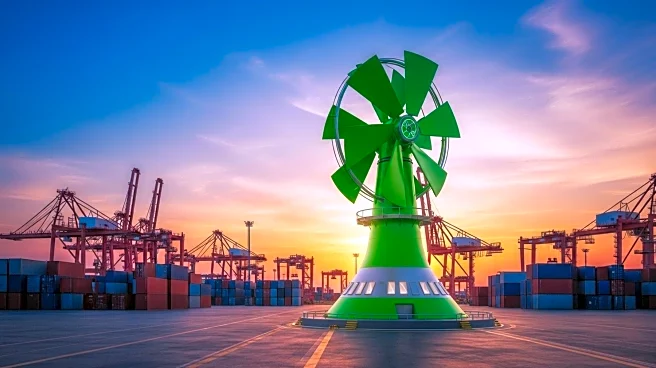What's Happening?
Brazil is making strides in decarbonizing its maritime transport sector, with five ports leading the charge in reducing greenhouse gas emissions. The National Waterway Transport Agency (ANTAQ), in collaboration with the German development agency GIZ, has been conducting a decarbonization study. This study, which began in 2021, has completed three phases, focusing on international experiences, emission reduction initiatives, and readiness for clean fuel adoption. The ports of Itaqui, Pecém Private Use Terminal, Paranaguá, Santos, and Açu have been selected for their strong Environmental Performance Index and ongoing energy transition projects. These ports are implementing measures such as solar panel installations, electric equipment, and incentives for low-carbon footprint ships. The Port of Açu has already completed its decarbonization plan, while others are developing theirs.
Why It's Important?
The decarbonization efforts at these Brazilian ports are crucial for maintaining Brazil's competitiveness in global trade and meeting international climate goals. By reducing emissions, these ports can improve air quality for coastal communities and align with global emissions reduction targets. The initiatives, such as the installation of solar panels and the use of low-carbon fuels, demonstrate a commitment to sustainable infrastructure. The study's recommendations, including the creation of a National Green Hydrogen Plan and tax incentives, could accelerate the adoption of clean fuels, benefiting both the environment and the economy. These efforts highlight the importance of sustainable practices in the maritime industry, which is a significant contributor to global emissions.
What's Next?
The ports are in the process of developing comprehensive decarbonization plans, with the Port of Açu already having completed its plan. The study encourages the implementation of green corridors to further reduce emissions from global shipping. Additionally, the creation of a National Green Hydrogen Plan and tax incentives are recommended to support the transition to clean fuels. As these initiatives progress, they may serve as a model for other ports worldwide, promoting sustainable practices in the maritime industry. The collaboration between Brazilian and German agencies underscores the importance of international cooperation in addressing climate change.
Beyond the Headlines
The decarbonization efforts at Brazilian ports could have broader implications for global shipping practices. By setting a precedent for sustainable port operations, Brazil may influence other countries to adopt similar measures, contributing to a global reduction in maritime emissions. The focus on green hydrogen and clean fuels also highlights the potential for innovation in energy sources, which could drive advancements in technology and infrastructure. These efforts may also lead to increased investment in sustainable practices, fostering economic growth while protecting the environment.










